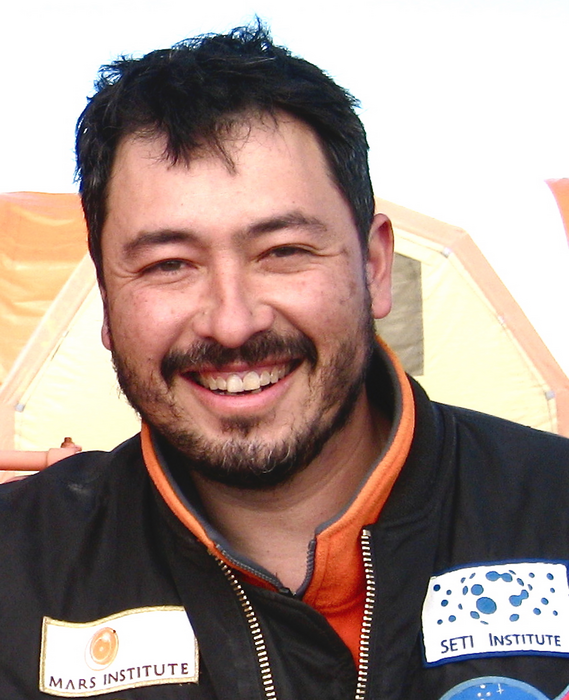April 26, 2023, Mountain View, CA — Dr Pascal Lee, a planetary scientist at the SETI Institute, has been selected by the National Space Society (NSS) to receive the 2023 Space Pioneer Award for Science and Engineering. This award recognizes “his trailblazing work in Mars science and exploration,” including his Mars analog fieldwork as leader of the NASA Haughton-Mars Project (HMP) on Devon Island in the Arctic – now in its 25th year of operation, and his proposal of the Cold Early Mars model. Lee has also made significant contributions to the design, development, and field testing of advanced concepts and technologies for future Mars exploration. The NSS Space Pioneer Awards honor individuals and teams who have made significant contributions to open the space frontier.

Credit: SETI Institute
April 26, 2023, Mountain View, CA — Dr Pascal Lee, a planetary scientist at the SETI Institute, has been selected by the National Space Society (NSS) to receive the 2023 Space Pioneer Award for Science and Engineering. This award recognizes “his trailblazing work in Mars science and exploration,” including his Mars analog fieldwork as leader of the NASA Haughton-Mars Project (HMP) on Devon Island in the Arctic – now in its 25th year of operation, and his proposal of the Cold Early Mars model. Lee has also made significant contributions to the design, development, and field testing of advanced concepts and technologies for future Mars exploration. The NSS Space Pioneer Awards honor individuals and teams who have made significant contributions to open the space frontier.
“The National Space Society’s coveted Space Pioneer Award has a long list of illustrious recipients, including radio astronomer and SETI pioneer Dr Frank Drake,” said Bill Diamond, President and CEO of the SETI Institute. “We are delighted to see Pascal’s career-long commitment to Mars exploration and his rich history of innovative research, technology development and field work be recognized by the NSS and we are proud to have another NSS Space Pioneer Award recipient at the SETI Institute!”
Lee’s latest contribution to Mars science and exploration is his team’s discovery, announced earlier this year, of a relict modern glacier near the Martian equator. “Finding signs of recent glaciation near the equator of Mars opens up new possibilities in our search for life on that planet. Also, if our relict glacier still harbors ice, it would mean that humans could have access to water in regions where the climate is significantly less frigid than at higher latitudes,” said Lee.
The NSS announcement also cites Lee’s other contributions to future Mars exploration, particularly the design, development, and field testing of many advanced concepts and technologies, from robotic rovers, helicopters, and hoppers, to spacesuits, crewed rovers – unpressurized and pressurized – and planetary habitats. Lee was scientist-pilot for the first field test of NASA’s Lunar Electric Rover. He also led the epic and record-breaking Northwest Passage Drive Expedition across the Arctic to study requirements of future long-range pressurized rover traverses on the Moon and Mars. The expedition was the subject of the award-winning motion picture documentary film “Passage to Mars.”
“Pascal is an inveterate explorer, whether charting new trails on Devon Island in the High Arctic or navigating countless images of Mars taken by NASA’s orbiters,” said Rod Pyle, Editor-in-Chief of the NSS’s premiere print quarterly, Ad Astra magazine. “His recent discovery of near-equatorial glacier remnants on Mars is a revelation, and this is just one small part of his ongoing efforts to help humanity reach the Red Planet.”
“I am truly humbled by this award from the National Space Society. The NSS is dedicated to advancing humanity’s expansion into space, and I am grateful to be working towards this future we dream of together, with the help and support of so many of my colleagues, students, and teammates along the way,” said Lee.
Dr Lee will be a featured speaker and receive his award at the NSS’ annual International Space Development Conference® (ISDC) on May 25-28, 2023, in Frisco, Texas. The NSS Space Pioneer Award typically consists of a cast globe of the Moon, but in a nod to Lee’s work, the NSS will present him with a cast globe of Mars.
See the National Space Society press release here:
https://space.nss.org/seti-institute-planetary-scientist-dr-pascal-lee-to-speak-at-the-nss-international-space-development-conference/
About the National Space Society
The National Space Society was founded in 1987 via a merger of the National Space Institute and the L5 Society. The NSS is the preeminent citizen’s voice on space exploration, development, and settlement. To learn more about the NSS and its mission to establish humanity as a spacefaring species, visit us on the web at space.nss.org. For information about the NSS Space Pioneer Awards, including a list of past recipients, visit: https://space.nss.org/national-space-society-space-pioneer-awards/ .
About the SETI Institute
Founded in 1984, the SETI Institute is a non-profit, multidisciplinary research and education organization whose mission is to lead humanity’s quest to understand the origins and prevalence of life and intelligence in the universe and share that knowledge with the world. Research at the SETI Institute encompasses the physical and biological sciences and leverages expertise in data analytics, machine learning and advanced signal detection technologies. The SETI Institute is a distinguished research partner for industry, academia and government agencies, including NASA and NSF.



